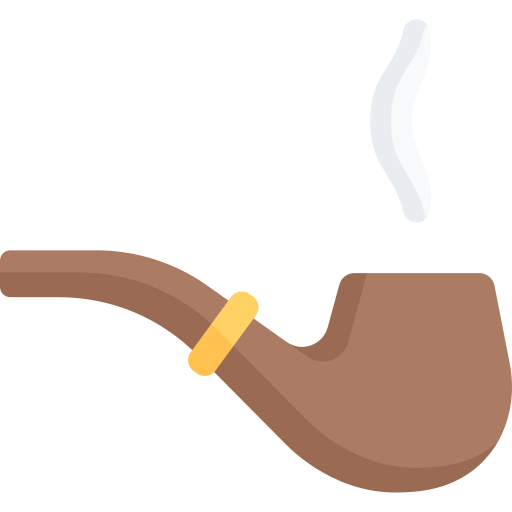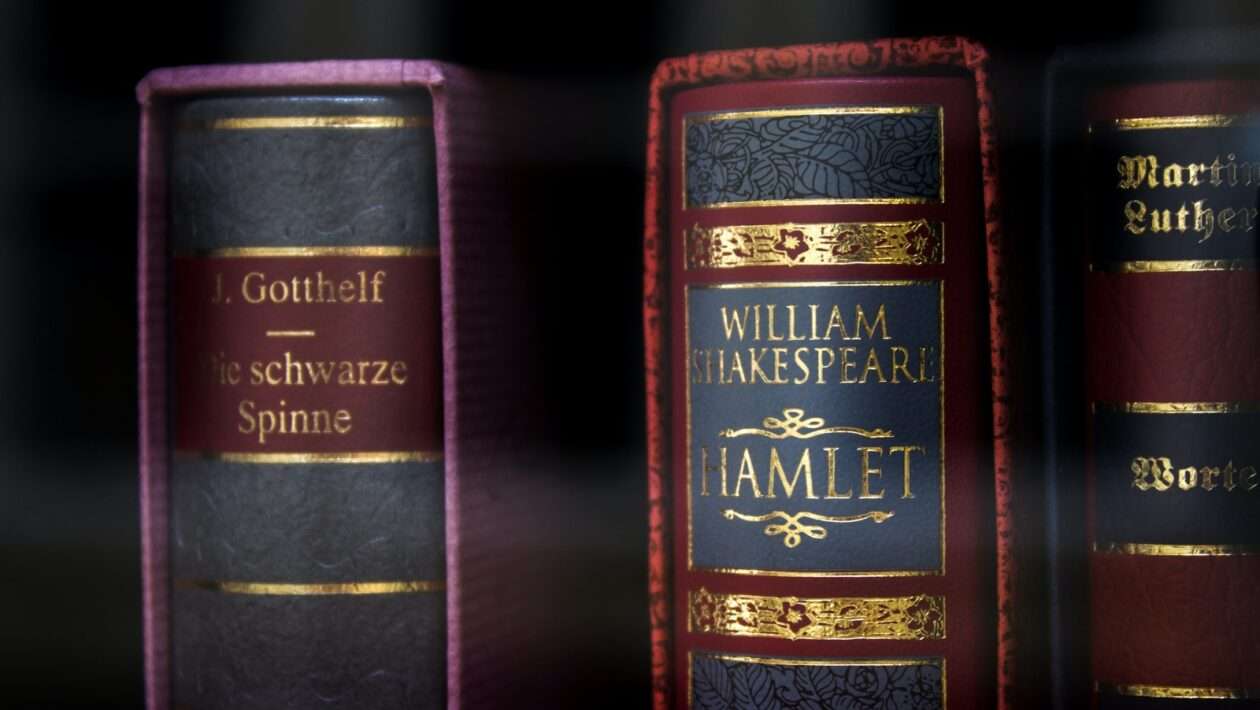(CM16: 120 cues); see especially S81-7, 93. SM36: ‘The brazen din of trumpets’ is a characteristic of the play. Under the direction of Peter Hall, with Dominic Muldowney’s settings, the instruments called for in the Egyptian Court were two Egyptian trumpets, bombard (with its bagpipe sound, this is an alto shawm), an oud (Arabic lute) and a narrow fiddle, the rebec, of Medieval English origin, and hand drums. For the ‘grotesque bacchanale’ on Pompey’s galley in II vii, Muldowney wrote for two trumpets, violin, tambourine, crumhorn and zitar (French medieval instrument with long frets) (Tirzah Lowen Peter Hall directs Antony and Cleopatra. London, Methuen, 1990 p. 115-6: LT references below).
B249: Octavius, Antony, Cleopatra and Pompey preceded by florid, trumpet flourishes, each being differentiated in character. Lowen also suggests that Pompey should be heralded by trumpets and triple drums. It is noted that Plutarch adds to the flutes played on Cleopatra’s barge to which Shakespeare alludes in II ii 200, ‘howboys, citterns and viols’ (after the translation by Sir Thomas North as quoted in T.J.B. Spencer ‘Shakespeare’s Plutarch’ 1964, p. 201). A member of the cast is described as, ‘The Boy, who sings’. The stage directions specify oboes in Act IV scene iii, while notwithstanding the allusions to music performance at the beginning of Act II sc v, no stage directions interject the text here.
| act | scene | line | Click here to find out more about suggested song | |
| I | i | 10 | Flourish [trumpets] MM40: not necessarily of trumpets | |
| ii | 189 | [Flourish trumpets] Exeunt | ||
| iii | 3-4 | [if you find him sad, Say I am dancing] | ||
| v | 8-10 | [Thou, eunuch, Mardian!/ What’s your highness’ pleasure?/ Not now to hear thee sing, I take no pleasure In aught a eunuch has.] | ||
| 71 | [I sing but after you] | |||
| II | ii | 27; 178 | Flourish. Flourish | |
| 201-2 | […The oars were silver, Which to the tune of flutes kept stroke] | |||
| v | 1 | LH204 [Give me some music– music moody food Of us that trade in love | ||
| 2 | [The music, ho!] [Enter Mardian] {Mardian enters to sing} | |||
| 11{-15} | […My music playing far off…] [Music plays] SM37 *broken consort. | 7 | ||
| II | vi | 0 | Flourish. Enter…with a drummer and a trumpeter (MM40: first use of trumpet) | |
| vii | 0 | Music plays. Enter two or three servants with a banquet. SM37 hautboys | 8 | |
| LH210: gives parts for treble viol and pandora; suggests hautboys, fifes, drum for 1599 broken consort version by Morley: bcM5 DOWLAND Piper’s Galliard (to Captain Digorie Piper’s pavin, see 9a below) [as consort SATTB viols + lute DA18, ۞CamE4; ۞CmD xi 14 ii/ ۞DeE5/ ۞DoL 19; ۞Ex18 / ۞FA ii 6/ ۞FG i 17; ۞FH3; ۞RoC15; rSSATB RC ii 43; rSAATB DAb 6; lute versions (CH53/ BO62) lute /tk D19 & D88; ۞BoD15/ ۞BreD18/ ۞BreG20/ ۞lD III 2/۞Mf2/ ۞OD v 20; (lute/k) LU12; ۞CmD ix 12; gDt 9/ Dd 9; 1597 lute song ‘If my complaints’ EL LS1 (i 1):4/ Df8/ PM ii 2/ FL iii 8/ GR83; ۞Aw i 3/ ۞BreE25/ ۞CmD i 4/ ۞FD18/ ۞Go9/ ۞Wb17; fEF 14:4/ BL i (f 15) 25/ BL iii (f12) 8; H/L+k S&B 5A/B; voice + g NR10; DOWLAND setting for SATB Ayres for 4 voices MB vi/ S&B 334; kMB lv 26; keyboard settings PHILIPS both MB lxxv:17 & 18; BULL ۞CmD v 16 ii; CORKINE b-v arr. MB ix 113, gBG6 | ||||
| 16 | A sennet sounded; LH276-80 no 5. Enter…{and a boy}. Richard Madelaine notes that the sennet is exceptionally used to announce a group rather than the usual single entry (CUP 1998). Peter Hall: Pompey heralded by trumpets and triple drum | |||
| 100, 102 | [Shall we dance now the Egyptian bacchanals] [Come, let’s all take hands]. | |||
| 105-7 | [All take hands. Make battery to our ears with the *loud music, The while I place you, then the boy shall sing,. The holding{i.e. refrain} every man shall bear as loud As his strong sides can volley] (B250) using wind instruments, all join in chorus | |||
| 109 | Music plays woodwind, with trumpets and drums which reinforce occasionally. | 9 | ||
| GPs ii 170/ GPc i 140/ GPd ii 126/ GPp i 410 The music for the revels on Pompey’s galley is given to woodwind, (including the SONG, trumpets and drums reinforcing it occasionally); SM37: certainly no hautboys accompanying+++ | ||||
| a) LH209-10: gives parts for treble viol and pandora: 1599 broken consort by Morley: bcM4 DOWLAND ‘Captain Digorie Piper’s pavan.’ D8; ۞CmD vii 14/ ۞EmR18/ ۞Ex 17/ ۞Ld iii 1/ ۞Mf6/ ۞OD ii 7/ ۞PaM23/ ۞Wb15/ ۞YC28/; lute (BO 21v 8); l/k LU 11/ Dbd8; ۞BreD22; gRP2; kPEERSON Piper’s pavane F182; ۞CmD v 16 i; anon arr. ۞CmD vii 14; rSATTB DAb5; lute/tk BB4, (CH 46v-47) CW267-8; lute/tk HT6; t LSoc C34: 2; ۞CamP 5 i/ ۞KnQ17/ ۞PaM23; | ||||
| b) LH211-2: 1589 jig: ‘Wilson’s wilde’ lute (DY59, p.112/ CH68v/ FD f3/ BA 112) WZ60, 60a-c; PI/cittern (CCf6) LSoc29: 2; ۞MsE i 7; gNR5/ SG51; rA + g RD34; BYRD kF157/ MB xxvii 37/ BYf 3/K75/ RV15; ۞Mh3/ ۞Mo ii 20/ ۞No 20/ ۞OH 13/ ۞Py22; rSATB ed. Stanley Taylor. Schott SA47 (1954); | ||||
| rSATB BYk2; rSSA/TAB BC ii 16; rS+k HU8; as ‘A Toy’ rB/A+k DE6; tune Eb50/ RE 10 ii/ K75; PRAETORIUS Courante P151 bc ۞PaD24/ YB6.; bagpipes and brass ۞YC27:1; Set to the words ‘Quoth John to Joan’ C86-7/ ۞YF6 i; WN67-8; set to ‘The Scotch tune’ | (287) | |||
| 110-115 | [53]. SONG. Come, thou monarch of the vine (NS127)/ Seng 211/ ME155-6: ‘Bacchanalian equivalent of Veni Creator’ GPs ii 170 boy’s voice | 10 | ||
| (114-5) | {All join in chorus} Cup us till the world go round | |||
| a) uLH211/ (B267-8): hymn parody ‘Veni Creator Spiritus’ solo and chorus [MB xxii 38 Come Holy Ghost, voice + ATT/BB viols] | ||||
| b) uSt20: adaptation of 1660 WILSON ‘Come thou Father of the Spring’ H+acc | ||||
| c) uS87: c1617 CAMPION ‘Come, o come, my life’s delight’ EL LS7 (ii 11):23; fEF5 | ||||
| d) S6: 1600 DOWLAND ‘Come, ye heavy states of night’ fEF16: 14; EL LS2 (i 5-6): 14; ۞Aw i 4/ ۞CmD ii 14; voice + rSATB DAb23 | ||||
| e) (B250): 1609 FERRABOSCO ‘If all the ages of the earth’ from the Jonson ‘The Masque of Queens.’ G143/ EL ii 16: 19/ Ayres no. 23; lute DR24-6; voice, lute (k) and b-v SA13; Chan ex. 19a-b, pp. 226-8, 228-9] | ||||
| f) uCM17-19 + à 4: ‘Millfield’ 1581; tune C185-6/ CW293/ E32/ Eb62/ RE40 iii/ G67/ SCvi/ SCt x 3 (tune & steps E32); r2S/2T Eh9; voice + rSATB DM3; ۞YF25 iii | ||||
| g) uDO109-110 set to ‘Hem, boys, hem’ round à 3; ۞DO ii 9 | (59a) | |||
| h) uDO110 set to ‘Maults come down’ round à 3 Rd15; ۞DO i 14 | (750) | |||
| [122] | [antimasque follows] LH212-3: 1611 Robert JOHNSON The Satyr’s masque | 11 | ||
| hautboys, fifes, drums and trumpets | (415a) | |||
| 129-131 | [These drums, these trumpets, flutes, what! Let Neptune hear we bid a loud farewell To these great fellows. Sound and be hanged, sound out!] Sound a *flourish, with drums (B250) rapid rolling of side drums | |||
| III | ii | 19; 69 | *{Trumpets within}; Trumpets sound. | |
| ix | 0 | (Alarum) | ||
| x | 0 | Alarum (B250) side drums and kettledrums to aid in uproar | ||
| IV | iii | 8-12 | Music of the hautboys is under the stage. [Peace, what noise?/ List, list!/ Hark!/ | 12 |
| Music i’th’air./ Under the earth] N169‘ominous music’, MM 41 ambiguous MH140-1 mysterious oboes. Cf. Gary Taylor on the use of oboes on the 16c. stage in SS liv (2001) 7-28 | ||||
| LH214-6: hautboy consort à 4 in short score: 1591 BYRD The Battell: 9 ‘The Burying of the dead’: kMB xxviii 113a/ BY4i/ RV7 | ||||
| iv | 22 | Shout within. Trumpets *flourish. LH215; 271: 1 | ||
| entr’acte | (drums and trumpets) | |||
| v | 0 | Trumpets sound. | ||
| entr’acte | (drums and trumpets) | |||
| vi | 0 | Flourish. | ||
| entr’acte | (drums and trumpets) | |||
| vii | 0 | *Alarum. Drummers and trumpeters LH271: 8 La charg conflictus | 13 | |
| 3 | (Alarum) | |||
| entr’acte | (drums and trumpets) | |||
| viii | 0 | Alarums LH217 1591 BYRD [The Battell, 6] The flute and the droome fife and | 14 | |
| drum CM402-8: rSSAT or pi+2fl+fl/ob+snare drum; kBY4f/ MB xxviii 94g/ RV5/PE26; ۞Mo vii 5:7 similar to the Arbeau tabulation for arigot (pipe, piccolo or descant recorder) ARe40-3 (in the Phrygian mode) 78 bars in duple time and ARe44-6: 76 bars in triple time | ||||
| 4 | Retreat sounded far off | |||
| ix | 0 | Alarum. Enter…in a march; drummers and trumpeters | ||
| 35-39 | [Trumpeters, With brazen din blast you the city’s ear; Make mingle with our rattling tabourins, That heaven and earth may strike their sounds together, Applauding our approach]. Trumpets sound | |||
| x | 29-30 | Drums afar off. [Hark! The drums demurely wake the sleepers] | ||
| V | ii | 109 | Flourish [Within] [‘Make way, there! Caesar!’] | |
| 186 | [Adieu]. Flourish | |||
| 211-2 | […scald rhymers Ballad us out o’ tune…] |

